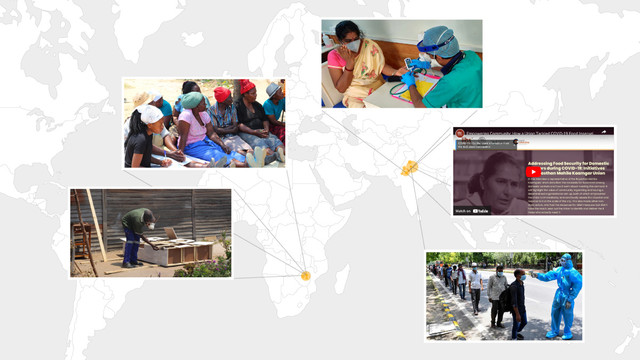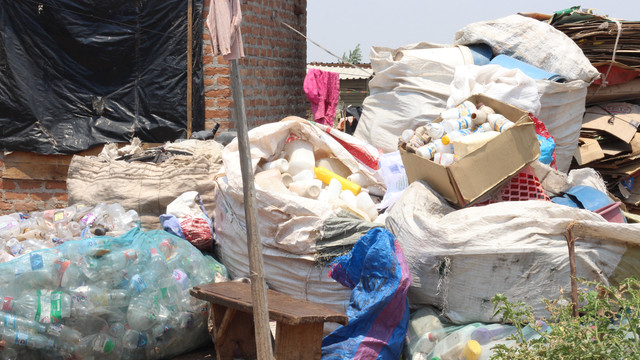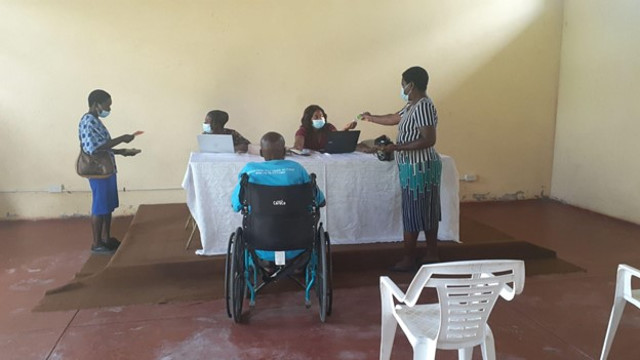Zimbabwe needs “more urban, more public” climate change strategy
Zimbabwe’s climate change strategy should focus on urban communities, give a greater role to civil society participation, and learn lessons and gain experiences from other highly vulnerable nations, according to a new briefing paper published today by ZERO Regional Environment Organisation (ZERO) and IIED.

Members of the Zimbabwe Homeless People's Federation learn techniques for building houses on land that is affected by climate-related hazards, including waterlogging. Picture: David Dodman.
The paper draws substantially on research and discussions with civil society organisations, as part of a wider project on adaptation to climate change led by ZERO, a Zimbabwean non-governmental organisation involved in environment and development issues.
"Climate change is a major challenge to Zimbabwe’s development because of the country’s poverty, lack of capacity to adapt and heavy dependence on rain-fed agriculture," says Shepard Zvigadza of ZERO. "The climate has already begun to change, with more variable rainfall and more frequent and intense extreme weather events. This makes work on a comprehensive strategy for adaptation all the more urgent."
The paper's authors — Donald Brown, David Dodman and Shepard Zvigadza — outline recommendations for policymakers and agencies that work on climate change adaptation. These include the following:
- Focus more on vulnerable urban people
Zimbabwe’s development policies have strong rural bias. Policymakers often state that only 20-30 per cent of Zimbabwe’s population is urban but, thanks to rapid urban growth (see paper) in recent years, the true figure is between 38 and 50 per cent. A continued focus on rural areas will mean that Zimbabwe misses opportunities in urban areas and could face yet bigger challenges there as climate change takes hold.
- Take advantage of knowledge and skills in civil society
Civil society organisations (CSOs) can help to close the gap between vulnerable people and the policymakers and planners whose job it is to protect them. In Zimbabwe, a growing number of CSOs works on climate change. Their knowledge and skills – and their connections with the most vulnerable communities – make the critical partners for policymakers to work with as they design, implement and evaluate climate change projects.
- Learn from other vulnerable countries
Zimbabwe shares many vulnerability traits and climate change challenges with other nations, but is not formally listed by the United Nations as one of the Least Developed Countries (LDCs) in the world. The LDCs have generated many important lessons in how to plan for, and finance adaptation activities, and Zimbabwe could learn from these and other highly vulnerable countries to prepare more effectively for climate change.
"A growing number of Zimbabwean non-governmental organisations, which have come together to form the Climate Change Working Group, have a wealth of experience that policymakers can draw upon as they develop the national response to climate change," says Zvigadza. He adds: "This includes strong connections with vulnerable communities and international research networks, as well as experience of the UN climate change regime and how Zimbabwe can benefit from it."
David Dodman, a researcher at IIED and co-author of the new paper, says: "Climate change is a significant threat to Zimbabwe’s development, but the country can take a number of steps now to help ensure it can adapt effectively to the changes ahead."
"One of the biggest challenges will be to pay adequate attention to the needs of the urban poor," adds Dodman. "The urban poor make up a growing proportion of the country’s population but receive only a small fraction of policy support. Ignoring their needs will create new challenges and could mean that Zimbabwe misses important development opportunities."
More than half of the world's people now live in urban areas. Many live in makeshift houses in unplanned areas that often lack adequate water, sanitation and waste collection. Such areas face hazards – such as flash flooding – that may become more frequent or intense as a result of climate change.
Zimbabwe has a total population of 12.9 million people, according to preliminary results of the 2012 national census.
Download the 4-page briefing paper
Download the research paper Climate change impacts, vulnerability and adaptation in Zimbabwe



